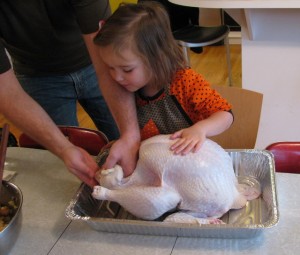A friend recently asked, knowing that Alex and I slaughtered a pig this spring, "Should my preschooler see an animal being slaughtered?" My answer is yes, with four important caveats. Witnessing an animal slaughter is not only culturally normal in the very recent past but can teach children valuable lessons.
But first the caveats.
1) A child must want to watch the animal being killed and butchered. It is not appropriate for a person of any age to be forced to witness something they are not interested in.
2) The child must be safe. Slaughtering often requires the use of sharp knives, has slippery blood on the ground, and a weighty animal hung. If a child is near, one adult must be dedicated to keeping the child free from the many potential dangers.
3) The slaughter should be individual and humane. I believe that no animal should be slaughter in an inhumane method and witnessing a disturbed animal will disturb a child. Also, the sensory assault of a large commercial-style slaughterhouse might frighten a child. The rest of this post assumes an experience where one animal is slaughtered and butchered at a farm or field-dressed for a hunted animal.
4) The parents must be ready for the consequences. A child will likely ask many questions about death, meat eating, pain, and anatomy. Parents should be prepared to answer questions honestly, throwing in a good "I don't know. Let's find out together," as appropriate.
So what are the potential benefits?
 Three to five year olds are fascinated with body parts. Heard any good poop jokes lately? They want to know how the body works. Naming parts and talking about their functions as an animal is butchered fills this development need.
Three to five year olds are fascinated with body parts. Heard any good poop jokes lately? They want to know how the body works. Naming parts and talking about their functions as an animal is butchered fills this development need.
Children do not come with a 'gross' sensor and are unlikely to think a dead animal is yucky until that concept is introduced by someone older. They are fascinated and may want to feel the dead animal. I encourage Lil to use all her senses. We talk about germs and bacteria afterwards while washing with soap.
Preschoolers are very curious about life and death. Even if a child doesn't witness the moment of death, seeing a recently dead animal can help them sort out what dying is like. When we find a dead animal (or watch the chickens kill a mouse), I help Lil notice what happens when an animal dies: it does not move or breathe or stay warm. It doesn't react to anything so we know it can't feel anything anymore.
Understanding what really happens during death helps a child process cultural stories and beliefs about death. After exploring a dead animal, they are more likely to believe that halloween skeletons and zombies are not real. They can see that the animal does not hurt, which may help kids overcome a fear of their own death.
Killing meat animals is part of the human food cycle. I believe that children and adults should explore the sources of all their foods, especially animal products. After seeing first hand where meat comes from, a child might hesitate to eat it. Parents need to be prepared to help the child understand why they believe it is ok to eat meat and what options they will provide in the case of refusal. I explain to Lil that everything we eat, plants and meat, are sacrificed from the natural life cycle. We try to honor that sacrifice by using ingredients to their fullest extent and minimizing waste.
Generations of farm families have allowed their children to participate in the raising and killing of animals. Children who grow up eating the meat they raise are as well adjusted as those who buy meat at the grocery. In fact, kids who understand where meat comes from are more connected to their food system, a characteristic that will make them more conscientious eaters for the rest of their lives. What do you think? Would you want your preschooler to see an animal slaughter?
Us city folk don't always have the opportunity to watch a humane slaughter in person. Many working farm parks do not slaughter their own animals so it can be hard to find a way to watch. I know that Historic Sauder Village does a hog slaughter at least once a year for guests to witness should they want to. Does anyone know of other resources for this?
Added to Simple Lives Thursday and Fight Back Friday.
